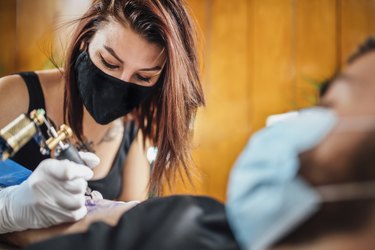
Getting a tattoo is nothing new — the very oldest ones we know of belong to Ötzi, aka the Iceman, who died sometime around the year 3250 BC, with 61 tattoos scattered over his body, per February 2016 research in the Journal of Archaeological Science.
More than 5,000 years later, tattoos are commonplace. An August 2019 Ipsos poll found that 30 percent of Americans have one, with the vast majority of them feeling content with their ink.
Video of the Day
Video of the Day
Still, this type of body modification is not without health risks. Keep in mind, the FDA does not regulate tattoo parlors (this is done at a state level) nor does it approve the inks used in tattoos. The FDA does, however, monitor adverse reactions.
And while tattoos can be removed, it's a painful, pricey and involved process. Here's what you need to know about the potential risks before getting inked, as well as details on what to look for in a tattoo parlor and how to care for your tattoo.
4 Health Risks That Can Come With Tattoos
1. You Could Get an Infection
A bacterial infection is the most common, occurring in the days after getting tattooed, says board-certified dermatologist Cybele Fishman, MD, with Advanced Dermatology PC.
When a wound occurs, your body reacts. Think about when you skin your knee: You might spot redness and swelling, followed by some itchiness and scabbing.
All of this occurs in the wake of a tattoo, too, according to the American Academy of Dermatology (AAD). But with an infection, you'll have more severe symptoms, such as pain, fever, pus or open sores.
These kinds of side effects are all reasons to see a physician, says Michele Green, MD, a board-certified dermatologist at Lenox Hill Hospital in New York City.
More severe viral infections — think: HIV or hepatitis — are also possible, Dr. Fishman says. "These are commonly caused by improperly sterilized instruments," she notes.
2. You Might Have an Allergic Reaction
Injecting your skin with dye can lead to an allergic skin reaction, Dr. Green says. This could occur immediately — or even decades following the tattoo, per the AAD.
The allergic reaction can look like eczema (that is, red, scaly and bumpy) appearing in days or weeks, Dr. Fishman says. "But [it] can also be granulomatous reactions, which look like bumps or nodules in the tattoo," she notes. This can occur weeks or even years after getting the tattoo, she says.
Some pigment may be contaminated with nickel, which can cause a severe reaction in people who are allergic to this metal, Dr. Fishman says. Around 10 percent of people in the United States are allergic to nickel, per the Cleveland Clinic.
Plus, some pigments cause a photoallergy. This means "the sun in combination with the tattoo pigments will cause the allergy," Dr. Fishman says. To alleviate this effect, cover the tattoo with clothing, stay in the shade and use sunscreen, per the AAD.
It's not only the ink that's a concern. Needle particles containing nickel and chromium may also make their way to lymph nodes, according to an August 2019 study in Particle and Fibre Toxicology.
3. It Could Trigger a Skin Disease
"Certain skin diseases like psoriasis and lichen planus can be triggered by a tattoo," Dr. Fishman says — that is, if you have psoriasis, it'll be more likely to occur where you have a tattoo, rather than on other parts of your body, she explains.
Tattoos can also lead to keloids, which are extra scar tissue, per the National Library of Medicine (NLM) or hypertrophic (aka thickened) scars, Dr. Fishman says. Keloids are challenging to treat, Dr. Fishman says. If you know you're prone to either of these conditions, do not get a tattoo, she recommends.
4. It Might Obscure a Melanoma
First up, the reassuring news: There's no "well-defined association" between tattoos and cancer, per an April 2016 review in Clinical Reviews in Allergy & Immunology.
There are reports of skin cancer happening in tattoos, Dr. Fishman says. This could be coincidental, and there's no way to prove it's due to the tattoo, she says. "But there is no way to prove they are not connected either," Dr. Fishman says.
Tattoo ink, which can contain known carcinogens, could be cause for concern, Dr. Green says. (Black ink, for instance, has benzo(a)pyrene.) "I just wouldn't want to be tattooed with something [that's] a carcinogen," she says.
But keep in mind there are many carcinogens around us; bacon, for instance, is considered a carcinogen, per the American Cancer Society (ACS). So too is alcohol, per the National Cancer Institute. Many still indulge.
Currently, there's no evidence to support a connection between cancer and tattoos — more research is needed to determine if one exists.
What is clear: A tattoo can obscure a melanoma, resulting in a delayed diagnosis. This happened to a patient of Dr. Green's, who had a melanoma growing within a tattoo of a dog. Curing melanoma is more likely when it's caught early, per the ACS.
Before You Get a Tattoo
People get tattoos all the time, without health issues. If it were that dangerous, no one would ever get one, Dr. Green points out.
"Like everything in life, you have to weigh the benefits and risks," Dr. Fishman says.
Here's what to keep in mind before you get a tattoo to protect your health:
1. Be sure. "I don't think it is a decision to take lightly, and definitely not one to make while you are drunk or high," Dr. Fishman says.
A September 2021 poll from Statistica found that 12 percent of Americans regret at least one of their tattoos, while the remaining percentage of those surveyed were regret-free.
If you wind up with regrets, you can get tattoos removed. But it's not an easy fix: "While the laser technology has improved significantly in tattoo removal, it is still not perfect, takes many treatments and is costly and not covered by health insurance," Dr. Fishman says.
Dr. Green notes it's one of the most painful things she does to patients.
2. Do your research. Before booking an appointment with a tattoo artist, make sure you're opting for a "top-notch, reputable person," Dr. Fishman recommends. You'll want conditions to be sterile (fresh needles, disinfected surfaces, gloved tattoo artists), and licenses to be in order, per the Mayo Clinic.
Keep in mind that regulations vary across the country. Don't be shy about asking plenty of questions, so you feel confident in the safety before the procedure.
3. Consider your medications. "Don't get a tattoo while on isotretinoin, and wait until three months after you go off of it to get one," Dr. Fishman says. (Isotretinoin is used to treat severe cystic acne. It's brand names include Zenatane, Absorica and Myorisan.) This medication will prevent your skin from healing quickly and effectively, she says.
Some medications may also increase your bleeding risk, such as blood thinners. If you have a history of blood clots or are taking blood thinners, talk to your doctor before you get a tattoo.
Follow any other medication instructions the tattoo parlor mentions.
4. Follow post-tattoo care instructions. The tattoo parlor will likely provide a handout with instructions, as well as signs that you should seek medical help.
Aim to carefully clean the skin, moisturize and keep the tattoo out of the sun for several weeks, per the Mayo Clinic. Avoid swimming and hot tubs during the healing process, and don't pick at the scab, according to the Mayo Clinic.
5. Follow up with a doctor as needed. You're going to have some symptoms after getting a tattoo, such as redness and itchy or flaky skin. But be on the lookout for more alarming side effects, such as fever, pus, hives or spreading redness around the tattoo, which merit a trip to the doctor.
- Journal of Archaeological Science: "The World's Oldest Tattoos"
- Ipsos: "More Americans have tattoos today than seven years ago"
- FDA: "Tattoos & Permanent Makeup: Fact Sheet"
- FDA: "Tattoos and Permanent Make-up"
- American Academy of Dermatology Association: "TATTOOS: 7 UNEXPECTED SKIN REACTIONS AND WHAT TO DO ABOUT THEM"
- Cleveland Clinic: "Nickel Allergy"
- Particle and Fibre Toxicology: "Distribution of nickel and chromium containing particles from tattoo needle wear in humans and its possible impact on allergic reactions"
- National Library of Medicine: "Keloids"
- Clinical Reviews in Allergy & Immunology: "Medical Complications of Tattoos: A Comprehensive Review"
- National Cancer Institute: "benzoapyrene"
- American Cancer Society: "What’s Wrong with Hot Dogs, Hamburgers, and Bacon?"
- National Cancer Institute: "Alcohol and Cancer Risk"
- ACS: "Can Melanoma Skin Cancer Be Found Early?"
- Statistica: "Are you happy with your tattoo(s) or do you regret the decision to get it/them? • I’m happy with it/them 88%• I regret the decision 12%"
- Mayo Clinic: "Tattoos: Understand risks and precautions"
Is this an emergency? If you are experiencing serious medical symptoms, please see the National Library of Medicine’s list of signs you need emergency medical attention or call 911.


